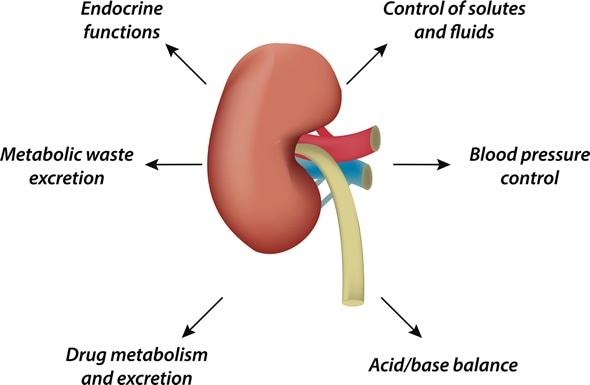The kidneys are bean-shaped organs that are around the size of a fist and located just below the rib cage, on each side of the spine. They are vital organs, meaning they are essential to survival.

The Functions of the Kidney: Image Copyright: joshya / Shutterstock
The main function of the kidneys is to balance the composition of the blood in order to maintain good health and let the body function. Most people have two kidneys, but sometimes people are born with only one. People can survive with just one kidney.
The kidneys filter about 30 gallons of blood every day, which removes around half a gallon of waste and extra fluid. Each kidney is made up of millions of tiny filtering tubes called nephrons.
A nephron is comprised of two parts: the glomerulus and the tubule. Blood cells and large molecules are strained from toxins and fluids by the glomerulus and then passed into the tubule, which collects essential minerals and passes them back into the blood, as well as filtering out additional toxins. During filtering, the kidneys create urine, which carries toxins away.
The urine is carried to the bladder via thin tubes of muscle called ureters. The bladder muscles relax while the bladder is filled with urine and once it is full, messages are sent to the brain to prompt a person to urinate. When this happens, the urine leaves the body via the urethra, which is found at the bottom of the bladder. Together, the kidneys, ureters, bladder, and urethra are referred to as the urinary tract.
The kidneys also perform many other functions including the production of hormones that regulate blood pressure, the maintenance of healthy bones, and the production of red blood cells. They also regulate the level of electrolytes such as sodium, potassium, and phosphate.
When the Kidneys Stop Working Properly
If a person’s kidneys become damaged or diseased, waste products accumulate in the blood, which can lead to fatigue, weakness, and nausea. People may also lose their appetite, feel irritable, or even find it difficult to think clearly. On the other hand, the decline in kidney function may be so gradual that a person does not experience these problems at all. Therefore, it is important that people make themselves aware of the symptoms of kidney disease, which include the following:
- Pain in the lower back
- Swelling, particularly in the ankles, wrists, or eyes
- Unusual discharge or a burning sensation during urination
- Change in urination frequency, particularly during the night
- Foamy, bloody, or dark-colored urine
- Hypertension
These symptoms may occur singly or in combination. Either way, if a person experiences them, they should consult their doctor, who will find out whether the kidneys are diseased or damaged using two main techniques. They will first assess how well the kidney is functioning by estimating the glomerular filtration rate and then check the urine for the presence of protein or albumin that is leaked into the urine when a person has renal disease.
Further Reading
Last Updated: Feb 26, 2019